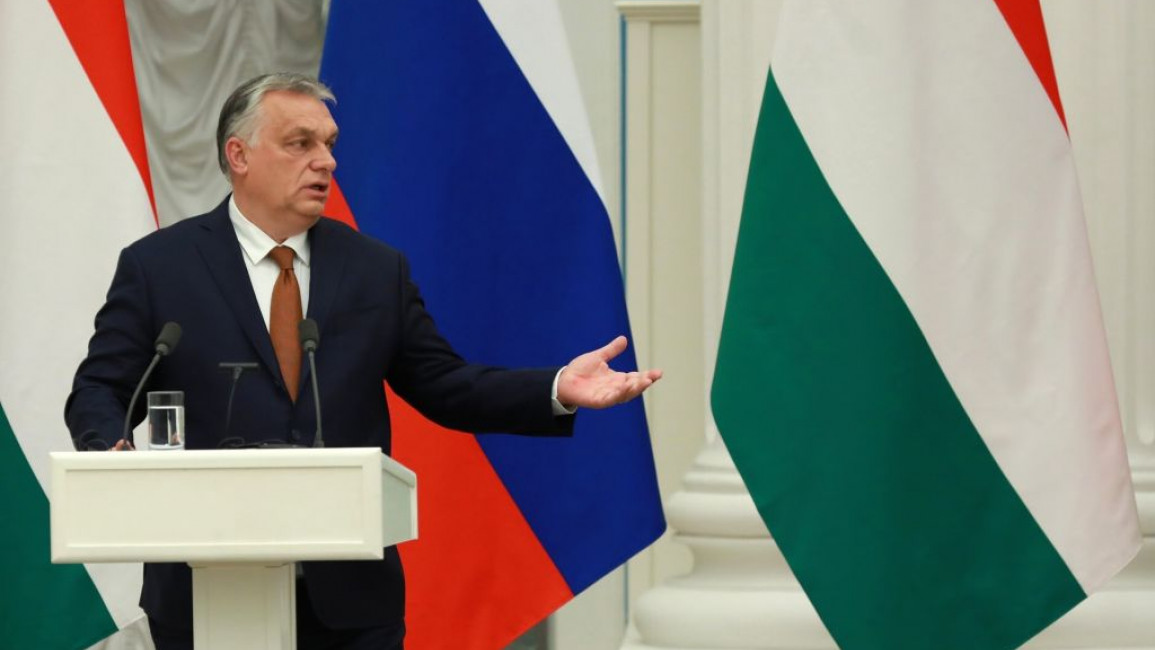Hungary's Viktor Orban pledges cooperation with Putin amid Ukraine crisis
Hungarian Prime Minister Viktor Orban met with Russia's Vladimir Putin in the Kremlin on Tuesday, pledging cooperation with Moscow for years to come in a trip criticised by his EU allies.
Orban travelled to Moscow despite Hungary's opposition accusing him of betraying national interests in doing so and with fears growing in the West of a Russian attack on Ukraine.
But Orban, who has led NATO-member Hungary since 2010, has friendly relations with Putin while presiding over deteriorating ties with Brussels.
"This is our 13th meeting. That is a rarity. Practically all those who were my colleagues in the EU are no longer," Orban said, sitting opposite Putin in the Kremlin.
Orban said he has no plans to leave power and that he expected to win an election in April, which is shaping up to be his toughest contest since taking office.
"I have high hopes that for many years to come we can work together," he said.
"I would like to assure you that no EU leader wants war or conflict. We are ready for a rational agreement," said Orban.
Putin thanked Orban for "doing a lot" for the Russian-Hungarian relationship and said the pair would discuss the security situation in Europe.
Speaking after more than five hours of talks, Orban said the differences between the West and Russia on the Ukraine crisis were "bridgeable".
"The situation is serious, the differences are substantial," Orban told reporters.
"But the existing differences in positions are bridgeable, it is possible to make such an agreement that both guarantees peace and Russia's security, and that is also acceptable for NATO members."
Orban had earlier said he wanted to increase gas imports from Russia during the trip, at a time when some in Europe accuse Russia of orchestrating an energy crisis to pressure European countries.
"I would like to reach the goal of increasing the volume of suppliers in the course of our meeting today," Orban told Putin at the outset of talks.
Putin told reporters after the meeting that Hungary - unlike some other European countries - would not have problems with gas supplies next year.
"Gas volumes to Europe have somewhere decreased to about 40 percent, and next year our partners in Europe will probably have problems. Hungary will not have them, because additional volumes have been agreed," Putin said.
Hungary's opposition last week said that by meeting with Putin, Orban "indirectly encourages the Russian president to further escalate the current tense situation."
US President Joe Biden has accused Russia of planning to invade Ukraine and warned of severe economic sanctions if it does.
Russia denies any plans to attack its neighbour but is demanding that Ukraine never be allowed to join the US-led NATO defence alliance as well as a series of other security guarantees.
Orban's visit was expected to sit uncomfortably with Hungary's allies in the European Union, most notably Poland.
Warsaw has presented a united front with Budapest against Brussels on issues such as the rule of law, but resents Orban's ties with Putin.
Polish Prime Minister Mateusz Morawiecki visited Kyiv on Tuesday for talks with Ukrainian President Volodymyr Zelensky, who is backed by the West.
Orban has not echoed the general EU alarm over Russia's troop buildup on Ukraine's border.
Hungary, which joined NATO in 1999 and the EU in 2004, has taken a softer line on Ukraine, with which it shares a small land border.
Hungarian Defence Minister Tibor Benko said Tuesday morning that leaders should shy away from "Cold War rhetoric".
"There's no need for 1,000 NATO soldiers to come to Hungary and be stationed here permanently," he told public media, adding that "no-one wants to create a situation where people are afraid and worried by showing off their forces".



